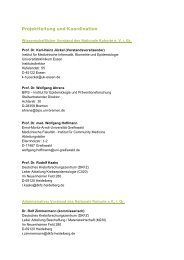Scientific Concept of the National Cohort (status ... - Nationale Kohorte
Scientific Concept of the National Cohort (status ... - Nationale Kohorte
Scientific Concept of the National Cohort (status ... - Nationale Kohorte
You also want an ePaper? Increase the reach of your titles
YUMPU automatically turns print PDFs into web optimized ePapers that Google loves.
205<br />
A.7 Ethical aspects<br />
To reach <strong>the</strong> general public, information and study results will be communicated via <strong>the</strong><br />
<strong>National</strong> <strong>Cohort</strong> website, articles in newspapers, press reports, radio, and television. Regular<br />
communication will be important so as to inform participants <strong>of</strong> general findings and to<br />
encourage continued participation. Therefore, it is planned that each participant receives<br />
regular newsletters with up-to-date information about <strong>the</strong> study. <strong>Scientific</strong> results will be<br />
published in national and international, peer-reviewed scientific journals. The state <strong>of</strong> <strong>the</strong><br />
project and results will also be presented at national and international conferences.<br />
Participants will receive <strong>the</strong>ir own individual study results as described above (Sect. A.7.2.5).<br />
A.7.2.7 value for <strong>the</strong> public and strategy to involve <strong>the</strong> public<br />
The <strong>National</strong> <strong>Cohort</strong> will provide unique data for current and future biomedical research.<br />
The study will build up a resource for research in all medical disciplines, enabling new and<br />
groundbreaking research on <strong>the</strong> relationships between heredity, environment, and lifestyle<br />
and <strong>the</strong>ir effect on <strong>the</strong> risk <strong>of</strong> chronic diseases. The results <strong>of</strong> <strong>the</strong> <strong>National</strong> <strong>Cohort</strong> will provide<br />
new information about <strong>the</strong> causes <strong>of</strong> diseases that will lead to new means <strong>of</strong> prevention,<br />
refined diagnostic methods, and <strong>the</strong>rapeutic opportunities. The overall findings and implications<br />
<strong>of</strong> results that derive from <strong>the</strong> <strong>National</strong> <strong>Cohort</strong> will be made available to participants<br />
and <strong>the</strong> wider community so that <strong>the</strong>y can influence public health strategies. Thus, data<br />
obtained with <strong>the</strong> <strong>National</strong> <strong>Cohort</strong> will serve as a public good. The <strong>National</strong> <strong>Cohort</strong> seeks to<br />
augment <strong>the</strong> value <strong>of</strong> <strong>the</strong> resource by stimulating best possible research projects in order to<br />
ensure that <strong>the</strong> greatest potential benefit for public health may be realized from this work.<br />
Prior to and during recruitment, in particular in <strong>the</strong> recruitment areas, well-organized public<br />
relations activities will be conducted, including advertisement in newspapers, radio stations,<br />
and public transports. Moreover, information about <strong>the</strong> <strong>National</strong> <strong>Cohort</strong> will be communicated<br />
via internet (<strong>National</strong> <strong>Cohort</strong> website, Wikipedia, and Facebook). For all potential<br />
participants <strong>the</strong>re will be a free telephone service.<br />
To reach people with a migration background, specific public relations activities will be set<br />
up. For instance, we will aim to promote <strong>the</strong> <strong>National</strong> <strong>Cohort</strong> by advertising in migrant-specific<br />
non-German-language media (e.g., radio stations) and informing <strong>the</strong> commissioners<br />
for integration, local organizations, and specific information centers for immigrants about<br />
<strong>the</strong> purpose <strong>of</strong> <strong>the</strong> study.<br />
A.7.3 Pre-evaluation <strong>of</strong> <strong>the</strong> proposed study from an ethical perspective<br />
The questions <strong>of</strong> how <strong>the</strong> public perceives <strong>the</strong> <strong>National</strong> <strong>Cohort</strong> project, which issues <strong>the</strong><br />
public identify as key for <strong>the</strong> society, and how <strong>the</strong> fact <strong>of</strong> <strong>the</strong> growing (transnational) cooperation<br />
<strong>of</strong> such projects and biobanks is perceived are topics <strong>of</strong> considerable importance<br />
for <strong>the</strong> project and might influence its development and acceptance. During <strong>the</strong> <strong>National</strong><br />
<strong>Cohort</strong> pilot period, a focus group project will deal with <strong>the</strong> issues <strong>of</strong> general knowledge and<br />
understanding <strong>of</strong> cohort studies and biobanks, opinions and perceptions according to data<br />
collection, data handling, data protection, consent, confidentiality, etc.<br />
The results <strong>of</strong> <strong>the</strong> focus group project can support several decision-making processes with<br />
regard to different key issues <strong>of</strong> <strong>the</strong> study. Critical issues, in particular ethical issues, identified<br />
by <strong>the</strong> focus group participants will be discussed and procedures for dealing with <strong>the</strong>se<br />
issues established.<br />
A.7



